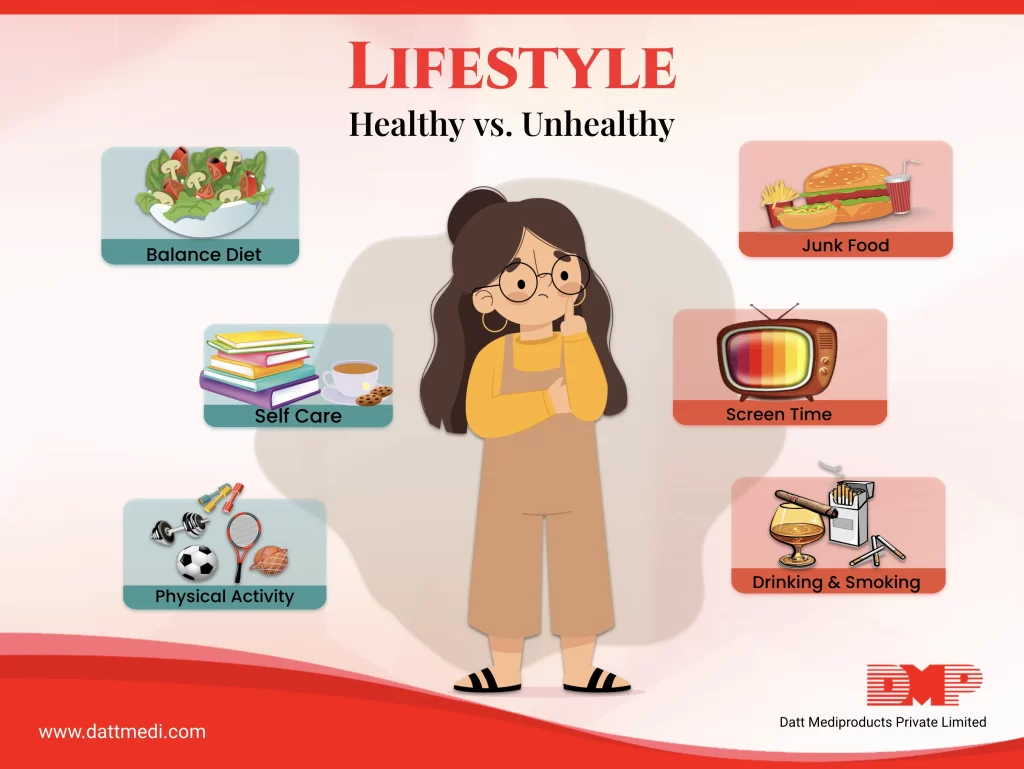
Lifestyle is the way of living of an individual. It includes their day to day behaviour, their functions at job, activities, personality, preferences, and diet.
As per Collins Dictionary “Lifestyle of a particular person or group of people is the living conditions, behavior, and habits that are typical of them or are chosen by them.”
According to people’s health, there can be two types of lifestyles: Healthy lifestyle and Unhealthy lifestyle. Good nutrition, daily exercise and adequate sleep are the 3 basic foundations of a healthy lifestyle, which keeps a person energetic, fit and at a reduced risk of developing disease. Not only this, lifestyle has a significant influence on physical, mental and social well-being of humans.
Still some people do not pay attention to their lifestyles. Lots of people nowadays have an unhealthy lifestyle, because of which they encounter illness, disability and sometimes even death.
There are several problems such as metabolic diseases, being overweight, joint and skeletal problems, cardio-vascular diseases, hypertension, violence, that is attributable to an unhealthy lifestyle.
Let’s discuss the various factors below:
DIET: Diet has a direct positive relation with health and is the greatest attribute of lifestyle. Eating fast food consistently, having a poor diet, may have consequences like obesity or cardiovascular issues.
SLEEP: Sound sleep is a prerequisite to starting a new day. It not only enhances productivity at work but also improves mood. Sleeps also aids in the healing process of the body. Conversely, a lack of sleep can cause negative emotions, restlessness, irritability, lack of concentration etc. Sleep has a direct influence on mental and physical health of an individual.
EXERCISE: Regular exercise along with a healthy diet is recommended by most physicians. It increases your physical and mental wellness and is very helpful in treating general health problems.
SUBSTANCE ABUSE: Addiction of any substance is considered part of an unhealthy lifestyle. In comparison to people with unhealthy lifestyle, healthy lifestyle people may choose to quit such substances like cigarettes or consume substances like alcohol in moderation. This can have a direct correlation with a lower chance of having several diseases such as cardiovascular disease, asthma, cancer, brain injury.
STRESS: Stress is an inevitable part of life but excess stress can lead to various health problems. Your body responds to everyday stress and if you do not relieve excess stress through relaxation, the effects can create muscular pain, headaches, sleep disturbances etc. Try following some relaxation techniques such as stretching, body massage, yoga, pursuing a hobby, reading or connecting with family and friends.
Another factors include proper use of technology and avoiding over-dependence and overuse. Start a new hobby, or a new language, or learn something new. Leaning a new skill forms the exercise of an individual’s soul. Research shows that learning new skills such as a language or a musical instrument could slow process of dementia and alzheimer’s disease.
In recent times, Lifestyle & its association with health has been studied by many researchers. As per WHO, 60% of factors related to an individual’s health and quality of life are congruent to lifestyle.
We understand that the relationship of lifestyle and health should be highly considered. Read our previous blog “Small Steps that lead to a healthier you” to know more about the various small habits and steps which can be followed every day for a healthier you.




